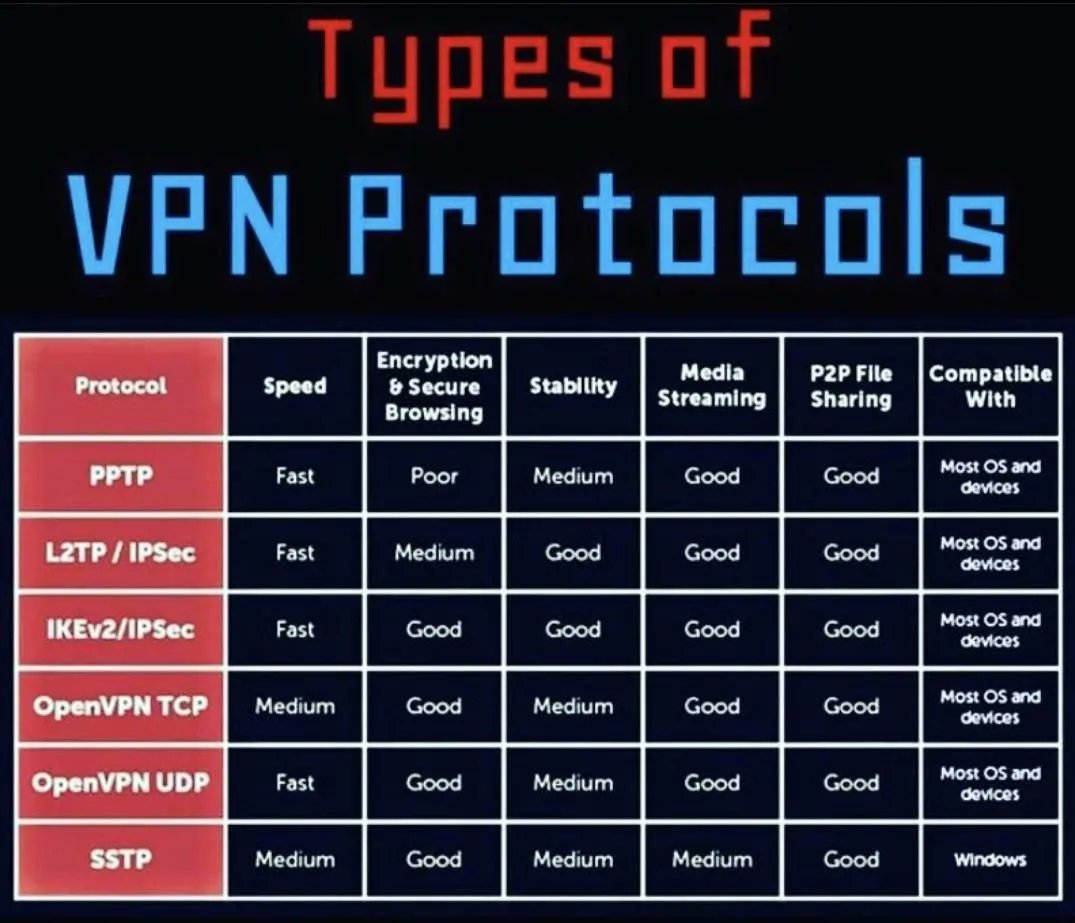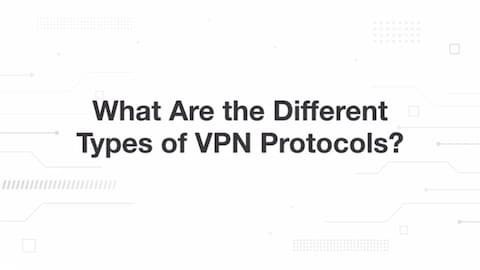VPN protocols are the backbone of secure internet connections. They determine how your data travels across the web.
Understanding different VPN protocols can help you choose the best one for your needs. In today’s digital age, privacy and security are crucial. VPNs, or Virtual Private Networks, use protocols to protect your data from hackers and prying eyes. With various types available, each protocol offers unique features and benefits.
Some provide faster speeds, while others offer stronger encryption. Choosing the right VPN protocol depends on your specific needs, whether it’s streaming, browsing, or securing sensitive information. In this blog post, we’ll explore the different types of VPN protocols, helping you make an informed decision for your online security.

Credit: x.com
Overviews of Contents
ToggleIntroduction To Vpn Protocols
Virtual Private Networks (VPNs) have become essential tools for online privacy. They help users secure their internet connections. This section introduces different VPN protocols. Understanding these protocols is key to choosing the right VPN service.
Importance Of Vpns
VPNs provide a secure connection between your device and the internet. They protect your data from hackers. They also ensure your online activities remain private. VPNs are used for:
- Bypassing geo-restrictions
- Securing public Wi-Fi connections
- Protecting sensitive information
- Maintaining anonymity online
The choice of VPN protocol impacts the speed, security, and performance of your VPN. It’s crucial to understand the various protocols available.
Interested in more about VPN? Here's an article you might find helpful. The Best Free VPNs for Torrenting: Secure and Fast Options
Evolution Of Vpn Protocols
VPN protocols have evolved over time. Each protocol offers different levels of security and performance. Below is a table highlighting some key VPN protocols and their characteristics:
| Protocol | Security Level | Speed | Compatibility |
|---|---|---|---|
| PPTP (Point-to-Point Tunneling Protocol) | Low | High | Wide |
| L2TP/IPsec (Layer 2 Tunneling Protocol) | Medium | Medium | Wide |
| OpenVPN | High | Medium | Wide |
| IKEv2/IPsec (Internet Key Exchange version 2) | High | High | Limited |
| WireGuard | High | High | Growing |
Each protocol has its own strengths and weaknesses. PPTP is fast but less secure. OpenVPN offers strong security but may be slower. WireGuard is a newer protocol with high speed and security.
Understanding the evolution of VPN protocols helps in making informed choices. Stay tuned as we explore each protocol in detail in the upcoming sections.
Point-to-point Tunneling Protocol (pptp)
The Point-to-Point Tunneling Protocol (PPTP) is one of the oldest VPN protocols. It was developed by Microsoft for creating secure connections. PPTP is popular because it is easy to set up and widely supported.
How Pptp Works
PPTP uses a control channel over TCP and a GRE tunnel to encapsulate PPP packets. This process creates a secure tunnel between the user’s device and the VPN server.
Here is a simple breakdown of how PPTP works:
- The user’s device connects to the VPN server using a username and password.
- The server authenticates the user and establishes a secure tunnel.
- All data sent through this tunnel is encrypted, protecting it from eavesdropping.
Looking for more insights on VPN? You may find this post valuable. Best Vpn for Japan: Unlock Fast, Secure, and Private Browsing
Pros And Cons Of Pptp
| Pros | Cons |
|---|---|
|
|
PPTP remains a viable option for basic needs. If security is a priority, other protocols may be better.
Layer 2 Tunneling Protocol (l2tp)
The Layer 2 Tunneling Protocol (L2TP) is a popular VPN protocol. It is often combined with IPsec for added security. L2TP creates a tunnel between two points on a network. This makes it great for secure communications.
L2tp Security Features
L2TP offers several key security features. These include:
- Encryption: L2TP itself does not provide encryption. But it is usually paired with IPsec for strong encryption.
- Authentication: L2TP supports multiple authentication methods. These include PAP, CHAP, and MS-CHAP.
- Integrity Check: It ensures data integrity using checksums. This helps prevent data tampering.
Benefits And Drawbacks Of L2tp
| Benefits | Drawbacks |
|---|---|
|
|
Credit: nordvpn.com
Discover more interesting content on VPN by reading this post. Private Internet Access Vs Surfshark: Ultimate VPN Comparison
Openvpn
OpenVPN is a popular VPN protocol known for its robust security. It uses open-source technology, which means it is constantly reviewed and updated by the community. OpenVPN can run on any port, which makes it versatile and hard to block. It’s a trusted choice for many due to its balance of speed and security.
Openvpn Configuration
Setting up OpenVPN might seem complex at first. It involves downloading the OpenVPN client and configuration files from your VPN provider. These files contain the necessary settings for connecting to the VPN server.
Next, install the OpenVPN client on your device. Open the client and import the configuration files. Once imported, you can connect to the VPN server. Some providers offer guides to simplify this process.
Advantages Of Openvpn
OpenVPN offers high-level encryption, ensuring your data remains private. It is compatible with most operating systems, including Windows, macOS, and Linux. This makes it accessible to a wide range of users.
OpenVPN also supports both TCP and UDP protocols. This flexibility allows users to choose between reliable connections (TCP) and faster speeds (UDP). Additionally, OpenVPN can bypass firewalls and network restrictions, providing unrestricted internet access.
Internet Key Exchange Version 2 (ikev2)
Internet Key Exchange version 2 (IKEv2) is a widely used VPN protocol. It is known for its speed and stability. IKEv2 is the successor to IKEv1 and offers enhanced security features. It is a popular choice for mobile devices due to its ability to reconnect quickly after a network change.
Looking for more insights on VPN? You may find this post valuable. Nordvpn Vs Expressvpn: Which VPN Reigns Supreme in 2025?
Ikev2 Mechanisms
IKEv2 uses a combination of powerful encryption and authentication methods. It supports multiple encryption protocols, such as AES, for secure data transmission. IKEv2 also employs key exchange mechanisms to ensure that only authorized users can access the VPN. It uses a process called “Mutual Authentication” to verify the identities of both the client and the server.
The protocol also supports advanced features like “Mobility and Multihoming Protocol” (MOBIKE). This allows seamless switching between different networks, such as moving from Wi-Fi to mobile data, without dropping the VPN connection.
Why Choose Ikev2
IKEv2 offers several advantages for VPN users. It is highly efficient and provides fast connection speeds. Its ability to quickly reconnect after a network drop makes it ideal for mobile users. IKEv2 also has strong security features, ensuring safe and private internet access.
Another reason to choose IKEv2 is its support for modern encryption standards. This ensures that your data is protected against potential threats. Additionally, IKEv2 is compatible with most operating systems, making it a versatile option for many users.

Credit: www.paloaltonetworks.com
Wireguard
WireGuard is a modern VPN protocol designed to be fast, simple, and secure. Unlike older protocols, it uses state-of-the-art cryptography. This makes it suitable for a wide range of devices, including mobile phones and routers. WireGuard aims to provide a better alternative to existing VPN protocols.
Wireguard Performance
WireGuard offers excellent performance due to its lightweight code. It is much faster than traditional VPN protocols like OpenVPN and IPSec. This is because it operates within the kernel space, reducing latency and increasing throughput.
Here is a comparison table to illustrate its performance benefits:
| Protocol | Latency | Throughput |
|---|---|---|
| WireGuard | Low | High |
| OpenVPN | Medium | Medium |
| IPSec | High | Low |
WireGuard’s performance is especially noticeable in environments with high network traffic. It can handle multiple connections without significant drops in speed.
Security Aspects Of Wireguard
Security is a strong point for WireGuard. It uses cutting-edge cryptographic techniques. These include ChaCha20 for encryption, Poly1305 for data authentication, and Curve25519 for key exchange.
Other important security features include:
- Minimal Attack Surface: WireGuard’s codebase is small, reducing vulnerabilities.
- No Dynamic Ports: The protocol uses fixed ports, making it harder to exploit.
- Perfect Forward Secrecy: Ensures past sessions remain secure even if current keys are compromised.
WireGuard also benefits from its simplicity. It avoids the complex configurations that are common in other protocols. This simplicity reduces the chance of security misconfigurations.
In summary, WireGuard is a robust option for VPN users. Its performance and security features make it a compelling choice.
Frequently Asked Questions
What Are Vpn Protocols?
VPN protocols are sets of rules that determine how data is transmitted over a VPN. They ensure secure and private communication between devices.
Which Vpn Protocol Is Most Secure?
OpenVPN is considered the most secure VPN protocol. It offers strong encryption and is highly configurable, making it a popular choice for privacy-conscious users.
Is Pptp Vpn Protocol Still Safe?
PPTP is not considered safe anymore. It has several known security vulnerabilities and is outdated. It’s better to use more secure protocols like OpenVPN or IKEv2.
What Is The Fastest Vpn Protocol?
WireGuard is often regarded as the fastest VPN protocol. It offers high-speed performance with strong security features, making it suitable for various online activities.
Conclusion
Choosing the right VPN protocol is important for security and speed. Different protocols have unique benefits. OpenVPN offers strong security. PPTP is fast but less secure. L2TP/IPsec balances speed and safety. IKEv2 is great for mobile users. Each protocol has its own use case.
Understand your needs before selecting one. A good VPN protects your data and ensures privacy. Stay informed and choose wisely.




